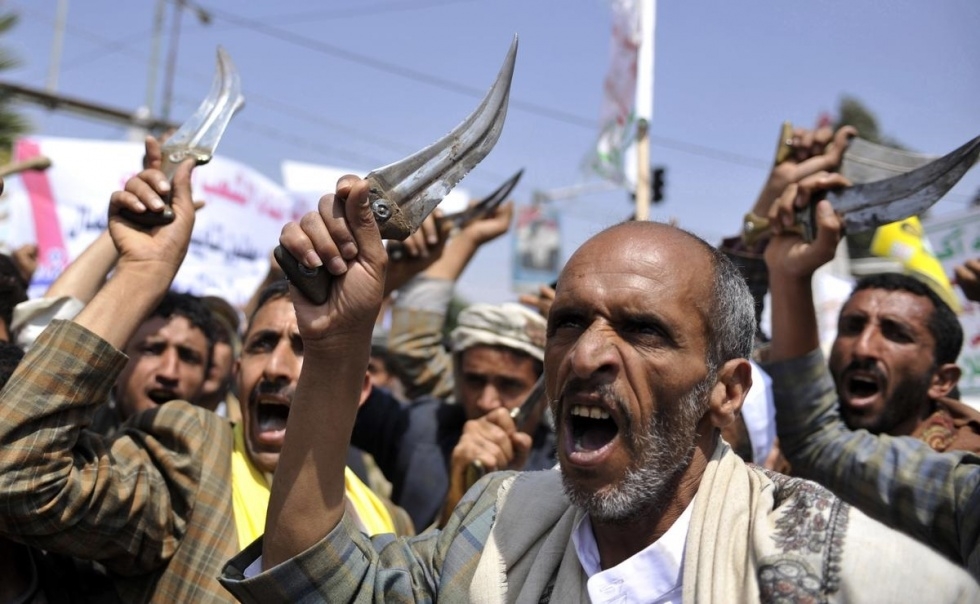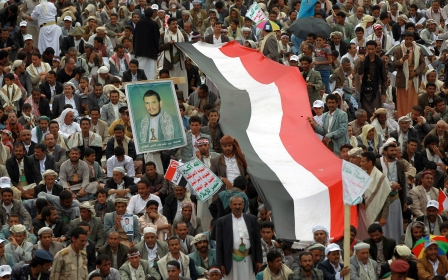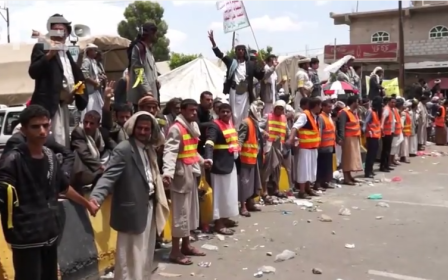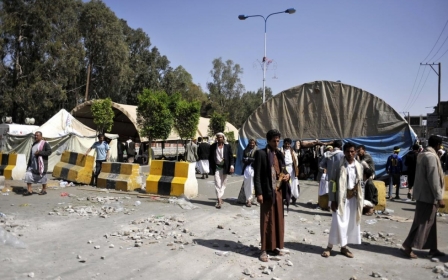Duelling protests grip Yemen capital as talks continue

SANA'A - Massive pro and anti-government protests gripped the Yemeni capital on Friday following reports that a peace deal to end months of sit-ins by Houthi rebels was close.
On the Houthi side, thousands of people took to the streets to attend the funeral of six protesters who were killed by police on Sunday and Tuesday, vowing to mount more protests until the government collapses.
The Houthis raised their popular slogan that calls for "death to American and Israel" and called for those who killed the protesters to be held accountable.
"There is widespread anger against the killings of the protesters in Sana'a and Amran," Usama Sari, a pro-Houthi activist told the Middle East Eye. "People are seeking justice and calling for the killers to be prosecuted."
Elsewhere in the capital, pro-government crowds took to al-Siteen Street in western Sana’a to show their solidarity with embattled President Abd Rabbuh Mansur Hadi.
While the Houthis are demanding that the government step down and calling for fuel subsidies to be reintroduced, pro-government supporters accuse the Houthis of using the controversial fuel price hike as an pretext to control the capital with the designs of establishing a Shiite state in Yemen.
The latest tensions first broke out in Sana’a on 18 August when the Houthis first began staging daily anti-government protests, but the violence has long plagued other parts of the country with the two sides grappling for control.
Friday’s protests came a day after seven Houthi protesters were killed in three explosions in the Houthi-run city of Amran in central Yemen, which first fell to Houthis in July and has seen periodic clashes with government-allied tribes ever since.
The official Saba news agency reported that the explosions were caused by explosive devices targeted Houthi gatherings and cars in the province and injured 12. Three of them remain in critical condition.
The Houthis blamed the Islamist Islah party - which holds several key ministries in the current General People’s Congress-dominated coalition government - for the attack. Islah denies the accusations.
"The same militiamen who killed protesters in Sana'a are responsible for the explosions in Amran,” Sari said.
Peace deal
Friday’s escalation follows on from reports on Thursday that Hadi had at long last penned a peace deal with the Houthis, after weeks of steadily-building protests that have seen rebels block the main airport road and set up encampments outside several ministries.
While presidential sources were widely quoted as saying that a deal had been struck, the Houthis were quick to shrug off the reports, although they did not deny that behind-the-scenes talks with the government were taking place.
"We have not yet reached or signed a final agreement and negotiations are still ongoing," Mohammed Abdulsalam, a spokesperson for the Houthis, said on his Facebook page on Thursday.
Local media reports said on Thursday that a committee - composed of two government officials and two Houthis – had been set up and authorised to provide a blueprint for an agreement. The two officials were named as Sana’a Mayor Abdul Gader Ali Hilal and Abdul Karem al-Aryani, a veteran politician and an advisor to the Yemeni president.
The Houthi representatives were named as Hussein al-Azzi, the political relations official for Ansarullah and Mahdi al-Mashat, head of the Houthi leader's office. Ansarullah, meaning the partisans of God, is the political movement representing the Houthi rebels, led by Sayyid Abdul-Malik al-Houthi.
According to the reports, the government offered slashing YR1000 ($4.7) from the price of a 20-litre container of fuel, but negotiations stalled after the Houthis suggested dismantling their camps and pulling out of the Sana’a suburbs in two stages. Hadi has repeatedly insisted that Houthi supporters withdrawal from streets immediately.
Though the naming of a new PM is a hot topic of debate, it remains unclear whether progress was made on this issue.
Deadly drone strike
Aside from the Houthi rebellion, the embattled government is also facing down a serious threat from al-Qaeda, launching a major offensive to try and root out the group in May.
On Thursday, a US drone strike killed five al-Qaeda militants in the southern province of Shabwa, local residents said.
The drone targeted a car carrying the militants in the district of Bayhan, the provincial capital.
Residents who rushed to the scene to rescue those hit were forced to make a speedy retreat when they heard a drone resume its hovering over the area, local sources said.
Yemeni officials rarely publicly admit that the US is engaged in covert drone missions in the country, and official media do not attribute the strikes to the US. Instead, the Ministry of Defence website reported on Thursday that Yemeni planes carried out the "successful" airstrike.
The dead militants were identified as Abdulla Ahmad Mubarak, Abu Khaled al-Awlaki, Abu Ka'ab, Saud al-Dighari and Saif al-Shihri, who is said to be a Saudi national. Local media published photos of bodies of the dead men strewn on the ground near a completely burnt-out car.
The US launched its controversial drone programme in Yemen in 2002, killing a prominent al-Qaeda figure in the province of Mareb. The strikes have carried on ever since, with the Bureau of Investigative Journalism estimating that somewhere between 2,350 and 3,790 people have been killed, including an estimated 400 to 950 civilians.
But al-Qaeda militants have seemingly been emboldened by political tension in the capital, and have used the opportunity to carry out a number of attacks.
On Thursday, armed men in a pickup truck gunned down Colonel Ahmed al-Haidari near the US embassy in Sanaa, while in the south two security officials were shot dead in the town of Huta, in Lahj province.
According to reports, the assailants approached Colonel Abdullah al-Doughais, an army officer, and opened fire as he was leaving his house. In the same area, militants shot dead Rashid al-Hawi, an intelligence officer, near his home.
New MEE newsletter: Jerusalem Dispatch
Sign up to get the latest insights and analysis on Israel-Palestine, alongside Turkey Unpacked and other MEE newsletters
Middle East Eye delivers independent and unrivalled coverage and analysis of the Middle East, North Africa and beyond. To learn more about republishing this content and the associated fees, please fill out this form. More about MEE can be found here.




